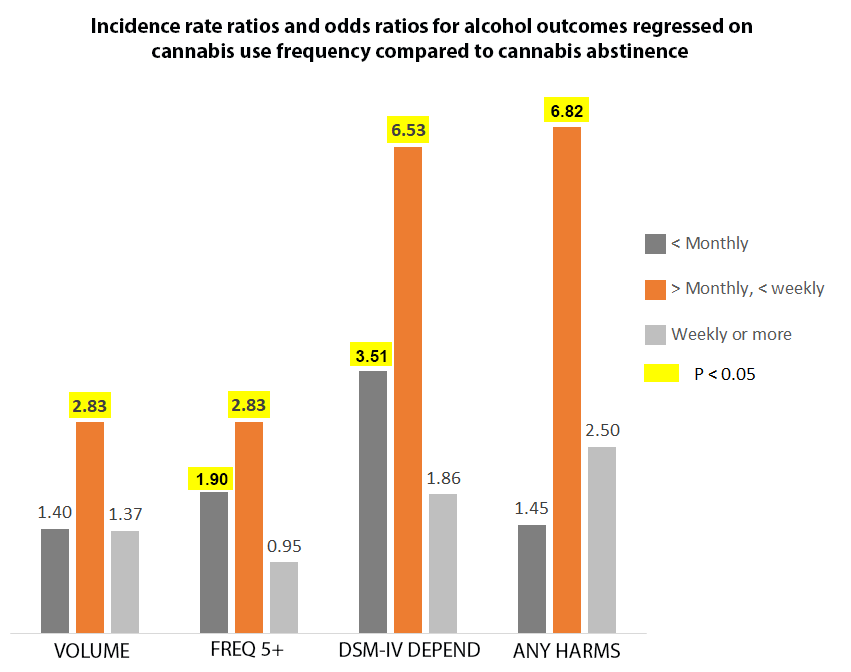New study links moderate cannabis use to persistent alcohol problems; finds no association for heavier or lighter use
 People with a lifetime alcohol use disorder (AUD) who used cannabis moderately had 2.83 times the number of drinks and experienced 6.82 times greater odds of alcohol-related harms than abstainers, according to a new study from ARG biostatistician and lead author Meenakshi Sabina Subbaraman and colleagues. Mid-level cannabis users also had an increased number of heavy drinking episodes and greater odds of alcohol dependence, compared to people who didn’t use cannabis.
People with a lifetime alcohol use disorder (AUD) who used cannabis moderately had 2.83 times the number of drinks and experienced 6.82 times greater odds of alcohol-related harms than abstainers, according to a new study from ARG biostatistician and lead author Meenakshi Sabina Subbaraman and colleagues. Mid-level cannabis users also had an increased number of heavy drinking episodes and greater odds of alcohol dependence, compared to people who didn’t use cannabis.
The study showed no significant differences, however, between cannabis abstainers and heavy cannabis users in how much they drank, the number of heavy drinking occasions, or alcohol-related harms.
“These results support the idea that some individuals with past alcohol use disorders successfully substitute cannabis for alcohol and thus reduce their alcohol problems, but more research is needed to identify those who are able to do so,” said Subbaraman. “Although heavy cannabis use is certainly not risk-free, taken together with results from our other studies, these findings suggest that the heaviest cannabis use is not linked to persistent alcohol problems.”
Heavy use was defined as using cannabis weekly or more. Mid-level use was categorized as more than monthly or less than weekly. Alcohol-related harms included effects of the user’s drinking on their family and friends, home life, work opportunities, financial situation, and health.
The study notes that mid-level users may potentially be using cannabis at parties or during events at which alcohol is served, whereas heavy users may use cannabis medicinally or more often in day-to-day situations that do not involve alcohol. It underscores the importance of assessing the context and motivation for cannabis use among individuals with persistent AUD, and the harms that may result from that use.
“With more jurisdictions considering legalization, we need to better understand how cannabis use affects alcohol consumption, in particular for this population since cannabis is the most commonly used drug among people with alcohol use disorders,” said Subbaraman. “While our study is a first step, additional research is needed to learn how best to support people both during and after treatment. For instance, alcohol treatment centers may want to reconsider the practice of expelling patients who test positive for cannabis use.”
Researchers assessed data from the 2005, 2010, and 2015 cycles of the National Alcohol Survey (NAS), a nationally representative survey of adults aged 18 and older.
###
Subbaraman, M.S., Barnett, S.B., Karriker-Jaffe, K. (2019). Risks associated with mid-level cannabis use among people treated for alcohol use disorder. Alcoholism: Clinical and Experimental Research: https://onlinelibrary.wiley.com/doi/abs/10.1111/acer.13973
Support for this paper was provided by the National Institute on Alcohol Abuse and Alcoholism at the National Institutes of Health under award number R21AA023039 (Subbaraman), P50AA005595 (Kerr), and T32AA007240 (Zemore). The content is solely the responsibility of the authors and does not necessarily represent the official views of the National Institutes of Health.
If you are interested in arranging an interview with Meenakshi Sabina Subbaraman, Ph.D., please contact Diane Schmidt, communications specialist, at (510) 898-5819 or dschmidt@arg.org.






